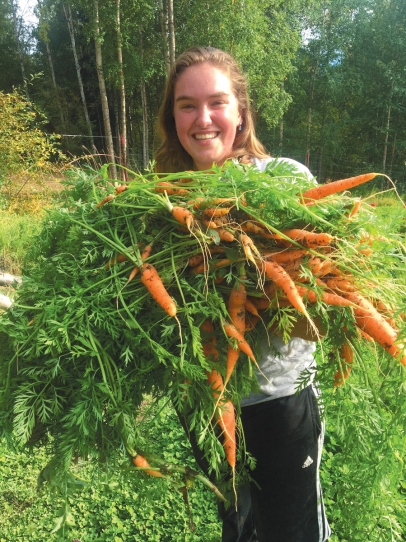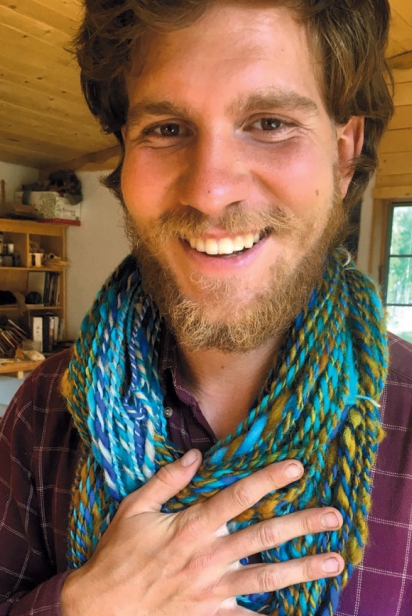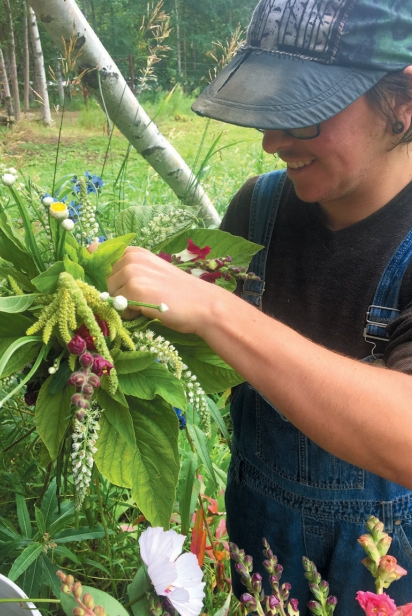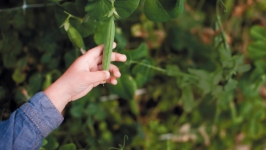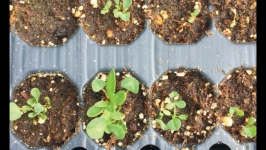Calypso's Farmers in Training Reflect on Lessons Learned
It was mid-September and with the summer hustle of planting and weeding and harvesting and selling crops and planting some more behind them, the farmers-in-training at Calypso Farm & Ecology Center were focusing on their futures. They had business plans to finish. I checked in with three of them to find out if their farm dreams had changed since my last visit in June — and if Calypso, Fairbanks, and life in Alaska had snagged their hearts. Though their plans for the future had shifted some, all had a common sentiment. Their time at Calypso had left them more grounded in the realities of farm life and given them an understanding that what they were really growing was a business.
Grand scale farming
A native of Pittsburgh, Pennsylvania, with years of experience working on farms, Carrie Bookheimer, 22, had big plans when she arrived at Calypso. She envisioned a future that included a large scale 50-acre farm for food production, focusing mostly on vegetables. Now? She’s sticking with the 50-acre footprint, but the rest of her plan has “expanded, for sure… I also incorporated grains, as well as dried beans and teas and medicinal tinctures — and some animals, but they’re more just for myself.”
She adds: “I became really interested in being able to produce grocery store commodities, like flour and beans. I want to be self-sufficient and be able to produce a whole range of things, like be my own grocery store in a way. I guess what helped me here is [seeing] that it’s not unreasonable to be able to do that on a smaller scale. It’s a feasible thing that can happen.” Eventually.
Bookheimer’s plan will require a serious cash infusion, which she hopes to raise from family and friends instead of a bank, and she would also like to get more experience first. For now, Bookheimer will head back to Pittsburgh where she’ll return to her farm job an hour outside the city. Next summer, perhaps another stint at Calypso, this time working as a farm hand instead of as a student. “It’s inspiring,” she says. Bookheimer recommends the program for people who are “serious about making farming part of their life. This isn’t just a dream anymore. I have this on paper.”
Funghi dreams
With a degree in environmental studies and both experience in and love of farming, Andy Marion, 25, “was really interested in looking at farms as ecosystems.” Now the future is still a bit cloudy, thanks to having too many interests, but the time spent at Calypso has helped bring things into focus.
“I originally had a really large scale permaculture production farm in the works and totally shifted gears from that. I realized that even though that was a really long term goal, it made a lot more sense to put in place something I could use and work with when I get home to the coast of New Hampshire,” says Marion. “I scaled down a lot and am just going to be doing the mushrooms, herbs, teas, and tinctures, and value-adds on top of that.”
The excitement ramps up in Marion’s voice when the topic turns to mushrooms. “They really are just fascinating as organisms because of how important they are to ecosystems. Also, so much of the nutritional value of them, they can be really powerful medicinal products. There’s so much you can do with them and they’re so much fun to grow.”
Marion will spend the next year back at the family property in New Hampshire, experimenting with crops and perfecting teas and tinctures. Once production growing begins, the plan is to bring products to farmers markets. “I think we all came to the realization that when starting a farm we’re also starting a business, and it has to be something that’s realistic both for our own time and for actually being able to make money doing it — and be happy, not working 90 hour weeks,” says Marion. “So keeping it smaller made a lot more sense in making it a business.”
Community action
When Ian Ellstrom, 25, arrived at Calypso, he had homesteading on his mind. “What I was trying to learn and take back was how to make a homestead actually functional instead of just a money sink, which people think farms are,” he says. “How to make a farm a viable place to live for me and my community.” But, of course, there’s that money issue. So he’s breaking the farm plan to pieces. When Ellstrom returns to Madison, Wisconsin, he’s planning to chat up neighbors and local churches to find out if they would be open to letting him farm some of their land, in exchange for some of the fruits (and vegetables) of his labor.
“Madison has always been a very foodie place, but it is changing as far as a city. It used to be a lot more local and connected, and there’s been quite a large suburban sprawl in the past 10 years. There’s a very strong gardening community and farming community, but they feel almost separate from the actual city development,” he says. “Overall my goal is to make people view cities in a different way and find the marginal places that can help out not only with food, but with holding water and building topsoil and housing places for the critters that we need in our cities.”
Ellstrom’s time at Calypso has definitely shaped his thinking, including his focus on building community through farming. “Being able to see them do it here made it a lot more approachable. I’m just blown away by the amount of constant positive energy at Calypso. It’s amazing — the community that I’ve felt in Fairbanks in such a short amount of time. I’ve only been here for four and a half months and I feel like whenever I go out to town I see somebody I recognize and know. That’s a pretty cool experience.”
Up next on the farm
With the farmers-in-training heading home and snow on the way, life at Calypso will quiet down a bit. But there’s still plenty to do and many a lesson from the 2017 class to fold into the program. In the final installment of Farm U, we’ll have one last chat with founders Susan Willsrud and Tom Zimmer to find out what they’ve learned — and who they would love to see pick up some farming tools with next year’s class. Will it be you?


